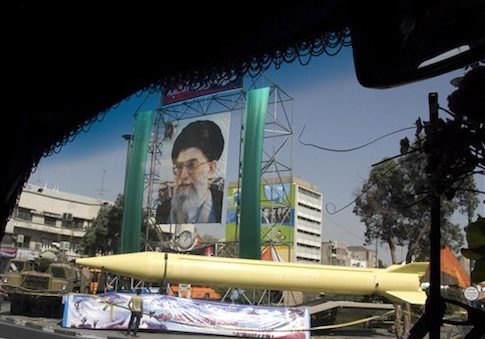Experts say the interim agreement reached between Iran and world powers could increase the proliferation of nuclear weapons in the Middle East despite assurances to the contrary by the Obama administration.
The deal agreed to in Geneva on Sunday eases financial sanctions on Iran in return for partial suspensions of its uranium enrichment, but critics say the constraints will only increase the country’s nuclear breakout time from about a month to two months and allow weapons research to continue.
U.S. allies in the region have come out in staunch opposition to the agreement. Israeli Prime Minister Benjamin Netanyahu called it "a historic mistake." Officials from Saudi Arabia said they "worry that Iran is not being sincere" and expressed concerns that the deal could permit Iran to "widen their influence in the region" and "become a bigger threat."
The trepidation among allies is a cause for concern in light of reports that Saudi Arabia could pursue its own nuclear program in response, William Martel, professor of international security studies at Tufts University’s Fletcher School and an expert on nonproliferation, said in an interview.
"Is there anyone who has come out among close friends and allies and said, ‘This is tremendous, where could we sign up?’" Martel said. "I’m not aware of any."
"Those states will take the steps required to protect their own security," he added. "There are reports that Israel would take action to prevent Iran from getting nuclear weapons."
"The more interesting and more immediate development is Saudi Arabia—Saudi Arabia will attempt to acquire its own nuclear arsenal."
Ben Rhodes, President Barack Obama’s deputy national security adviser, sought to allay fears that the interim deal could spark a nuclear arms race in the Middle East.
"If we can get strict verifiable constraints to make sure [Saudi Arabia] doesn't need a nuclear weapon, we can avert that scenario," he told MSNBC’s Chuck Todd on Monday. "The Saudis have sufficient energy reserves. We believe they should be able to meet their needs with the current state."
However, observers have noted that the same logic should apply to Iran. While Saudi Arabia is the world’s largest producer and exporter of petroleum, Iran is just behind them as the fourth largest exporter of crude oil worldwide, according to a 2010 Congressional Research Service (CRS) report.
"The decision to develop or acquire [nuclear weapons] is entirely independent of possessing oil supplies," Martel said, adding that the Iranian leadership has attempted to acquire them since the Islamic Revolution of 1979.
"I’m unpersuaded that anything in their strategic calculus has changed in that regard."
Iranian officials insist that their nuclear program is intended to achieve energy independence and provide a more reliable source of electricity. Yet the CRS report suggests that the regime has perpetuated those problems with its own policies, including heavily subsidizing gasoline consumption, not investing in domestic refineries, and allowing the Islamic Revolutionary Guard Corps (IRGC) to smuggle out gasoline exports for profits.
Former Deputy National Security Adviser Elliott Abrams told Fox News on Monday that Iran’s enrichment is "not a peaceful energy program."
"They want a nuclear weapon," he said. "And this deal really does not turn them away from that."
Martel said previous international agreements have failed to curb the spread of nuclear weapons, pointing to the recent example of North Korea. He added that the Obama administration must be careful not to let the president’s domestic troubles and plunging public approval cloud its judgment on Iran.
"With the battering that the administration has taken over the last couple months over domestic issues, I worry that can increase the incentives on the part of the administration to do something in the field of foreign policy to restore a sense of credibility in the policy sphere," he said.
